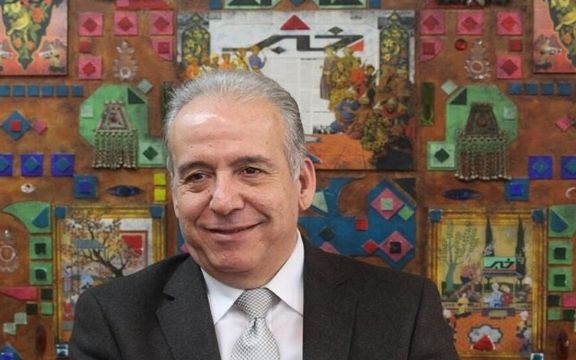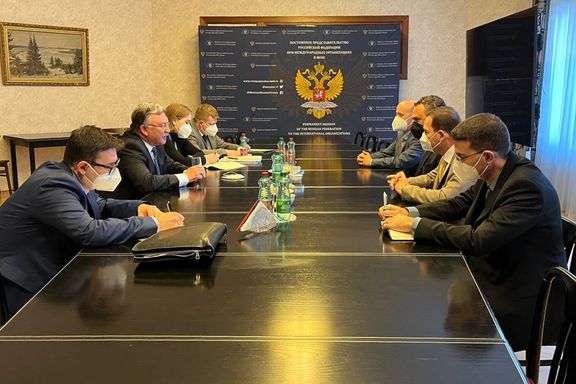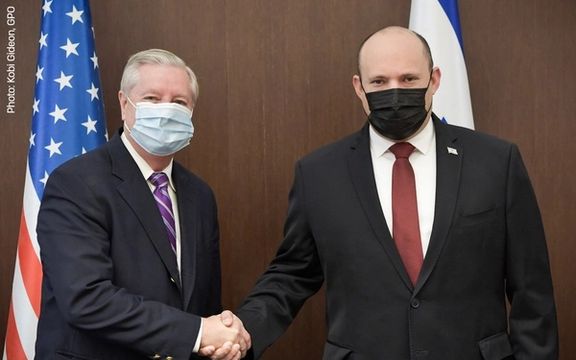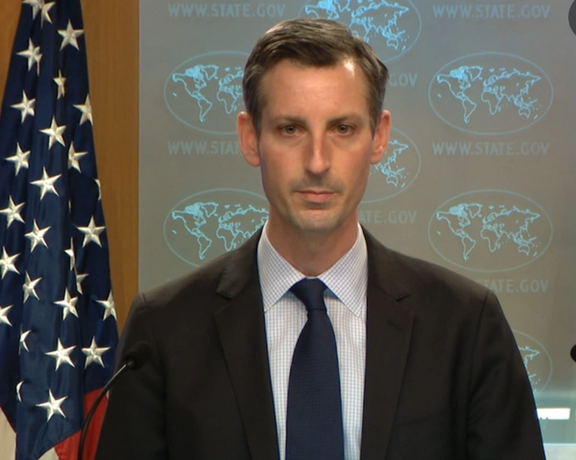Former Official Says He Left Iran Talks Due To Difference Of Opinion

Over a month after Richard Nephew left the US negotiating team in Vienna, he has published a series of tweets to elaborate on the reasons behind his move.

Over a month after Richard Nephew left the US negotiating team in Vienna, he has published a series of tweets to elaborate on the reasons behind his move.
Nephew, who is known as the architect of Washington’s sanctions on Iran, was serving as the deputy to US especial envoy to Iran Robert Malley until December 6, when he left the US negotiating team along with two others, over what was reported as differences with Malley at the time.
In a series of tweets on Tuesday, Nephew said he stepped down from his post “due to a sincere difference of opinion concerning policy”, adding that he no longer serves in the State Department since last week and intends to return to academia.
“Although my views and record have been and continue to be mischaracterized by quite a few people, I do not intend to convey any further details at this time or in public, given the ongoing nature of discussions in Vienna”, he added.
Advocating a tougher posture, Nephew, along with two other US negotiators, left the team because the Biden administration failed to achieve a more assertive approach in the talks, the Wall Street Journal reported.
Nephew, who is a non-resident Senior Fellow at the Brookings Institution, published a book about the sanctions in 2017, titled The Art of Sanctions: A View from the Field.

The Chairman of the Iran-China Chamber of Commerce has said that Iran had “imported goods in return for all the oil that we have sold China.”
Majid-Reza Hariri told Mehr news agency in an interview published Monday that China owes no money to Iran for oil imports but does hold Iranian assets.
Hariri argued there had been confusion over $21 billion in Iranian assets that some reports have suggested are in China due to Chinese fears of punitive United States action against anyone buying Iranian oil or interacting with Iran’s financial system.
The business leader said that Iranian money in China consisted of Iran's reserves – cash, bonds, and stocks − that had been transferred to China years earlier in fear of confiscation.
"After 2007 there was a possibility of confiscation of Iran's currency reserves in international banks, particularly European banks, because of legal suits brought against Iran by some European countries or the United States," Hariri explained.
Iran is known to have moved hard currency reserves and bonds to China from banks in Britain, Germany, France and Switzerland to protect them from being confiscated. Washington this week announced it will seize $7 billon of Afghan reserves held in the US.
Hariri said India, like China, had exported goods to Iran as an alternative to dollar payments. These, he pointed out, had included medicine and pharmaceutical ingredients. But other countries, he said, including South Korea − where over $7 billion of Iranian assets are frozen in fear of US action − and Japan had refused payment in kind.
With the administration of President Joe Biden continuing ‘maximum pressure’ sanctions, Washington said in January it would waive any threat of sanctions on South Korea only with “everything” agreed in Vienna on reviving the JCPOA, where talks are reportedly in their final stages..
Billions of dollars of Iranian money is frozen abroad in fear of US sanctions, including in South Korea, Japan, China, Europe, India, and Iraq. The semi-official Iranian Students News Agency (ISNA) estimated in November the total at $50 billion, with $8 billion in South Korea, $3 billion in Japan, and $6 billion in Iraq.
Some countries such as Iraq to which Iran exports electricity and gas but not oil, freeze the money so the volume of frozen money is growing in their banks. Iraq now owes Iran around $7 billion for gas and electricity to Iran.
Other countries such as South Korea, Japan, and India no longer import crude oil from Iran so the assets frozen in their banks date back to before full US oil sanctions went into effect in May 2019, when Washington offered eight countries waivers to import limited quantities of Iranian oil.
China continued buying oil from Iran even after the US imposed full sanctions. The volume was less than 200,000 per day from May 2019 until late 2020, when it increased reaching to more than 500,000 in 2021 and even more by December-January.
The Biden Administration reportedly does not attempt to vigorously enforce the sanctions, as Chinese importers believe the risk of violating the sanctions are relatively low.

Israel has sent officials to Vienna to meet participants in talks trying to revive the 2015 Iran nuclear deal, which Israel has opposed.
Nour News – an official Iranian outlet affiliated to the Supreme National Security Council –tweeted that “the overt and unexpected presence of the Zionists in Vienna is undoubtedly a deterrent to progress in the current sensitive situation.”
The Israeli delegation, headed by Joshua Zarka, the foreign ministry’s deputy director general for strategic affairs, met Tuesday with Mikhail Ulyanov, Russia’s top negotiator in the Vienna talks, and Monday with Rafael Grossi, director-general of the International Atomic Energy Agency (IAEA). Although Israel is a member of the IAEA, its nuclear arsenal is not subject to IAEA monitoring as Israel is not a signatory of the Nuclear Non-Proliferation treaty.
Ulyanov played down the significance of Zarka’s trip, tweeting that he had met with “Israeli colleagues from the capital and their Permanent Mission in Vienna” to discuss issues related to the IAEA. Russia has long called on both Iran and the US to return to the JCPOA.
Zarka tweeted in reply: “Thank you for a frank and important discussion.”
The Israeli delegation also met the United States Special Envoy on Iran Robert Malley, who leads a US delegation taking part indirectly in the Vienna talks, as well as representatives from China, France, UK, and Germany.
“Zarka went to Vienna to check what is cooking,” a senior Israeli official told the Axios website. “He met everyone other than the Iranians."

Visiting Israel Monday, United States Republican Senator Lindsey Graham compared Iranians to the Nazis and said they “cannot be ignored.”
Graham repeated his attacks on negotiations underway between Iran and world powers in Vienna to renew the 2015 Iran nuclear program. “When it comes to the Iranian nuclear program, guardrails are missing around Iranian nuclear ambitions”, Graham said, calling for “red lines” over Iran’s stockpile of enriched uranium, ‘weaponization’ of that stockpile, and ability to ‘deliver’ potential weapon.
A supporter of former President Donald Trump withdrawing the US from the 2015 agreement, the JCPOA (Joint Comprehensive Plan of Action), Graham said that while the crisis in Ukraine, or China’s relationship with Taiwan were “important, consequential moments in history… the one we’re not talking about enough is even more consequential: that the Iranians break out and acquire nuclear capability.”
While Russia and China were “rational” if “thuggish,” Graham said, “Iran is a theocracy motivated by religion [Shia Islam] that compels them to purify their faith and have the world submit. The Nazis wanted a master race, and the Iranians want a master religion. People like that cannot be ignored.”
‘There will be war’
Graham then evoked the Nazi holocaust: “I guarantee you the Jewish people can’t live that way…One Holocaust was enough. There will be war. Why can’t Iran have nuclear weapons? Because Israelis say, ‘Never again.’”
As some Israelis pointed out on social media that former top Israeli security and defense officials had supported the JCPOA, Graham met with Prime Minister Naftali Bennett, Foreign Minister Yair Lapid, Defense Minister Benny Gantz, and former premier and close Trump ally Benjamin Netanyahu, who faces a raft of corruption charges.
“I mentioned the idea of formalizing a mutual defense agreement, in very limited circumstances that would involve existential threats to the Jewish state [Israel],” Graham said. “What I’m trying to say is that I want a clear message to be sent in the 21st century, that destruction of the Jewish state means war with the United States.”
Netanyahu discussed a possible defense agreement with Trump in 2019 but Gantz opposed the idea as a departure from Israeli security policy. Rights group Amnesty International recently called for a halt in the US’s substantial arms sales to Israel.
On Friday, Democrat Bob Menendez and Graham introduced a bipartisan resolution that would ‘allow’ any Middle Eastern state access to nuclear fuel if they agree not to enrich or reprocess uranium. As a signatory of the Nuclear Non-Proliferation treaty Iran has the right to enrich uranium for peaceful purposes under international inspections but restricted the program under the JCPOA. Israel maintains a nuclear arsenal outside the NPT without international monitoring.

Saudi Arabia's government expressed on Tuesday its support for "US efforts to prevent Iran from acquiring a nuclear weapon," state news agency SPA reported.
The government also thanked the US for supporting the kingdom defending its territory against attacks by Yemen's Iran-aligned Houthi group, SPA said, citing a statement issued after a cabinet meeting.
Negotiations on a new nuclear accord with Iran are underway in Vienna amid growing Western fears about Tehran's accelerating nuclear advances, seen by Western powers as irreversible unless a deal is struck soon.
Saudi Arabia, along with Israel, opposed the 2015 nuclear agreement, JCPOA, and supported former US president Donald Trump's decision to withdraw from it in 2018. So far, Riyadh had not particularly endorsed the Biden Administration's decision to return to the agreement and the talks in Vienna.
State Department spokesperson, Ned Price, said on Monday that the current rounds of talks "is the final decisive stage", adding that “we are going to be a bit more circumspect in terms of progress."

US State Department says this is the final decisive stage in nuclear talks with Iran to determine whether a mutual return to compliance with the JCPOA remains a possibility.
During his press briefing on Monday, department spokesperson Ned Price said, “we are going to be a bit more circumspect in terms of progress that we may be seeing on the ground in Vienna precisely because we are in the final stages of what is by any measure a complex negotiation with key stakeholders”.
Asked about the positive comments on the progress made in Vienna by European Union foreign policy chief Josep Borrell and by the Russia’s envoy, he said, “Our European partners as well as China and Russia – all of us urgently seek to achieve an understanding, but time is almost out. Time is very quickly ticking away”.
“We have been very clear that at the current rate of Iran’s nuclear advances, we have little time left, and that’s precisely because at a certain point very soon those nuclear advances will obviate the advantages that the JCPOA, as it was finalized in 2015 and implemented in 2016, initially conveyed”, he added.
Earlier in the day, Iranian Foreign Minister Hossein Amir-Abdollahian discussed with Borrell the latest status of the talks in Vienna, blaming the West for lack of an agreement in nuclear talks and emphasizing that Tehran will not back down from it "red lines."